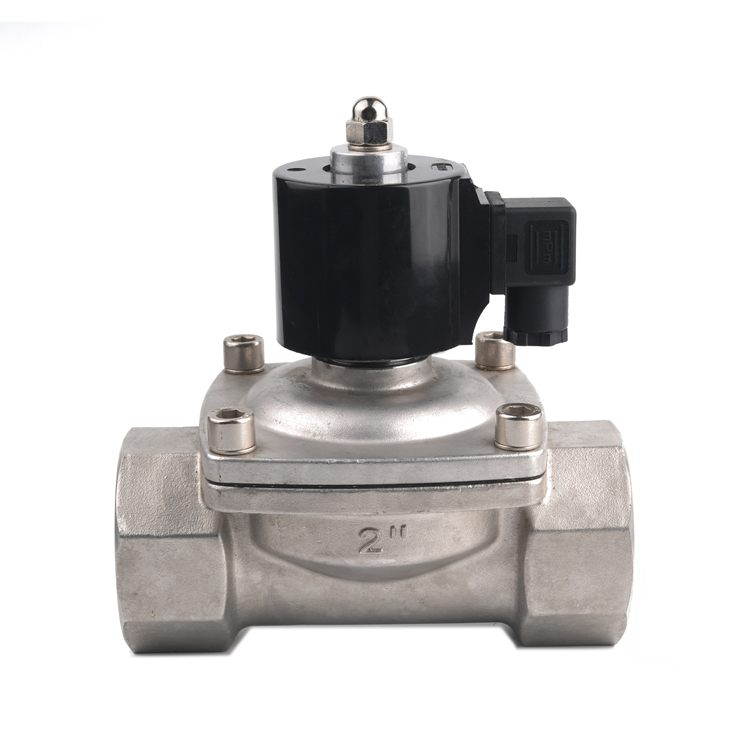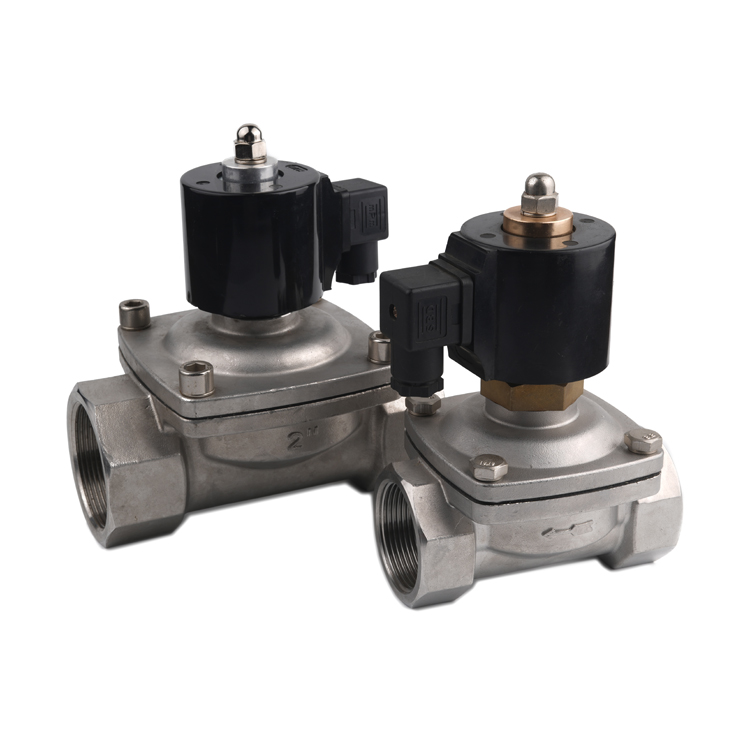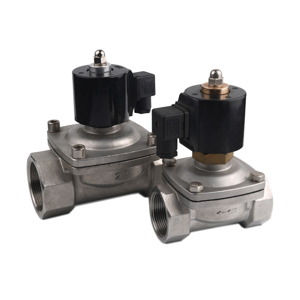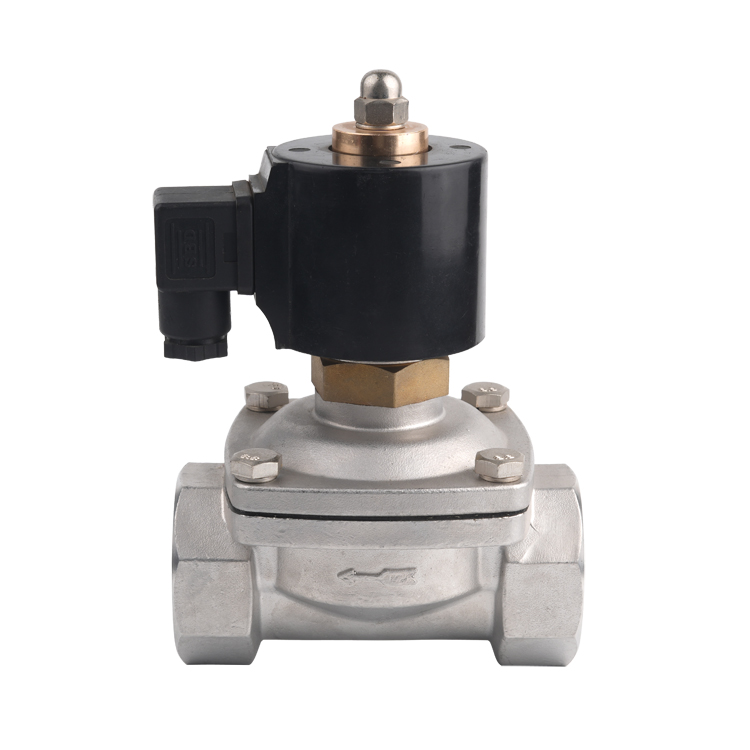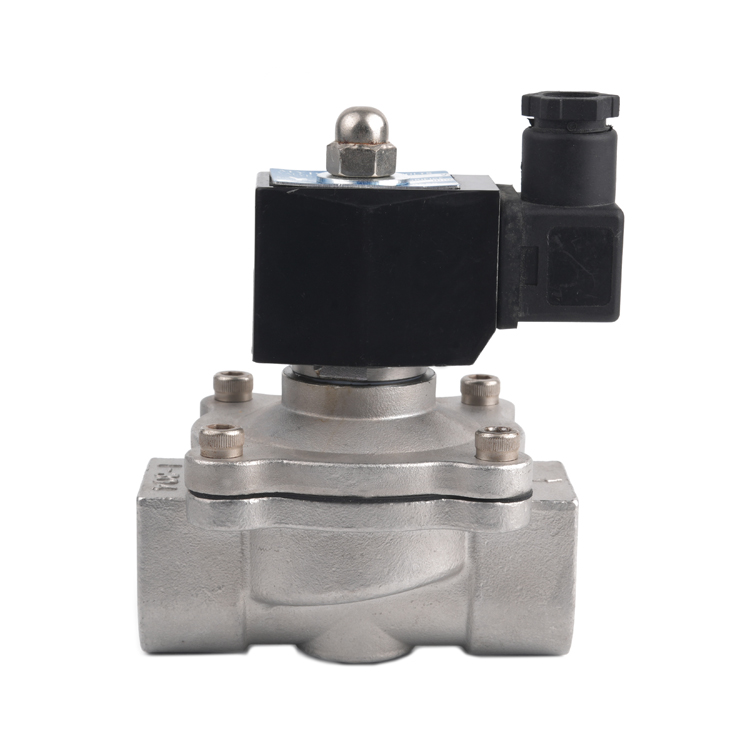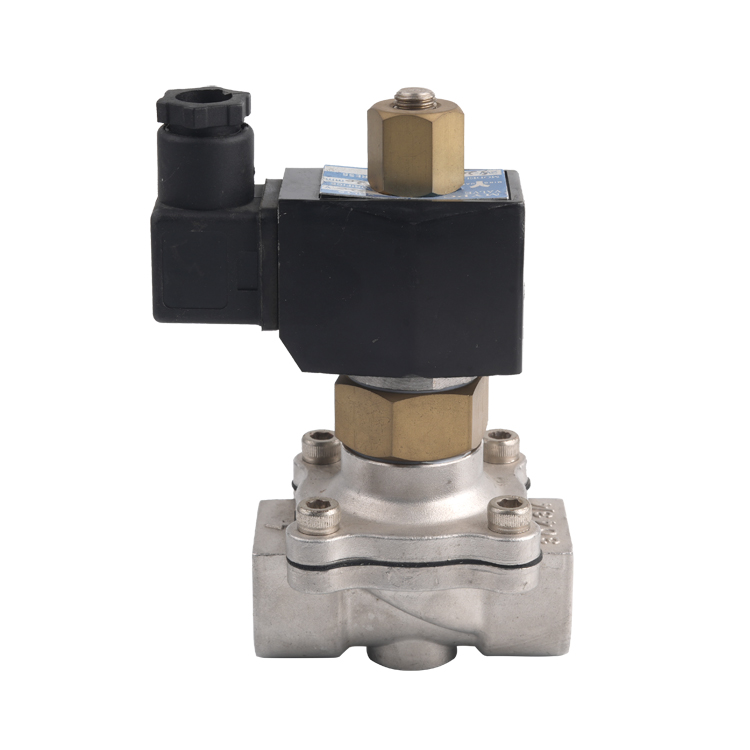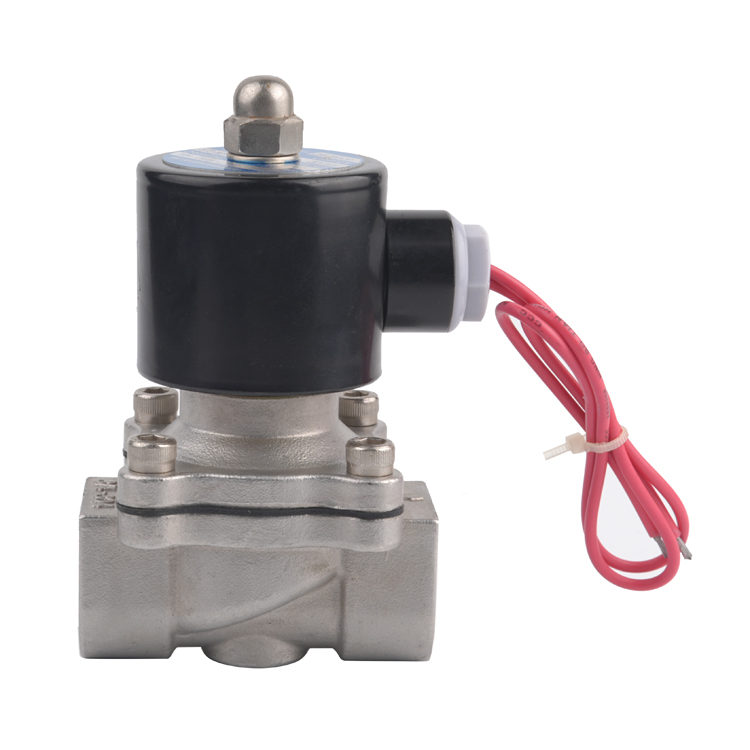2S500-50
Product classification:2S Series Two- position Two-way Stainless Steel Solenoid Valve
1.Suitable for controlling the liquid, gas, light oil (≤ 20CST) and other media, the use of the structure of direct-acting, zeropressure to open the valve, flow rate, and high reliability.
2.Bodymade of stainless steel SS316 Precision Casting.
Coil Parameters:
AC220V 110V 50Hz/60Hz DC 24V 12V
Plastic coil IP65 /ClassF
Standard Junction Box
Hulled coil IP54 /ClassF
Leaded /Available for other voltage coil
Plastic coil: DN2.5-25mm AC20VA DC 18W
DN35-50mm AC40VA DC 30W
Hulled coil: DN2.5-5mm AC16VA DC16W
DN10~25mm AC 20VA DC 28W
DN35~50mm AC 46VA DC 30W
Option:
Seal Material: Viton (-10 ℃ ~130℃), EPDM (-10 ℃ ~110℃), VMQ (-20 ℃ ~110℃), ect.
Coil: Steel coil, Plastic coil
Thread connection: NPT thread, RC thread, ect.
Time timing controller (only with plastic coil)
Solenoid valves are devices used to control the flow of liquids or gases, and they are commonly employed in various industrial and commercial applications, including the following areas:
Automation Control Systems: Solenoid valves are widely used in automation control systems to regulate the flow of liquids or gases, such as in automated production lines, industrial robots, and manufacturing equipment.
Hydraulic and Pneumatic Systems: Solenoid valves play a crucial role in hydraulic and pneumatic systems, controlling the direction and pressure of hydraulic oil or compressed air, used in applications like hydraulic jacks, pneumatic cylinders, and hydraulic machine tools.
Cooling and Heating Systems: Solenoid valves can be utilized to control the flow of cooling water or heating fluids in cooling equipment or heating systems, such as air conditioning systems, heating systems, and cooling towers.
Drinking Water and Wastewater Treatment: Solenoid valves can be applied in drinking water treatment and wastewater treatment systems to control water flow, filtration, and mixing operations.
Medical Devices: In medical equipment, solenoid valves are used to control the flow of gases and liquids in devices like respirators, infusion equipment, and dialysis machines.
Laboratory Equipment: Solenoid valves are widely used in laboratories for the automated control of liquid or gas distribution and flow, in equipment such as automated experiment setups, liquid chromatographs, and gas chromatographs.
The advantages of solenoid valves include:
Fast Response: Solenoid valves can rapidly open or close, providing quick fluid control, suitable for applications that require rapid response.
Precise Control: Solenoid valves offer precise fluid control, allowing for the adjustment of fluid flow and pressure by modifying the valve's operation.
Remote Control Capability: Solenoid valves can be integrated with control systems, enabling remote control and automation, reducing the need for manual intervention.
Durability: Solenoid valves typically have a long service life and can operate in various harsh environments, including high temperatures, low temperatures, high pressures, and corrosive media.
Multiple Specifications and Types: Solenoid valves come in various specifications and types to meet the diverse requirements of different applications, including varying sizes, materials, and operating principles.
In summary, solenoid valves play a critical role in various industrial and commercial applications, providing precise fluid control and automation capabilities, which enhance efficiency, reliability, and safety.
2.Bodymade of stainless steel SS316 Precision Casting.
Coil Parameters:
AC220V 110V 50Hz/60Hz DC 24V 12V
Plastic coil IP65 /ClassF
Standard Junction Box
Hulled coil IP54 /ClassF
Leaded /Available for other voltage coil
Plastic coil: DN2.5-25mm AC20VA DC 18W
DN35-50mm AC40VA DC 30W
Hulled coil: DN2.5-5mm AC16VA DC16W
DN10~25mm AC 20VA DC 28W
DN35~50mm AC 46VA DC 30W
Option:
Seal Material: Viton (-10 ℃ ~130℃), EPDM (-10 ℃ ~110℃), VMQ (-20 ℃ ~110℃), ect.
Coil: Steel coil, Plastic coil
Thread connection: NPT thread, RC thread, ect.
Time timing controller (only with plastic coil)
Solenoid valves are devices used to control the flow of liquids or gases, and they are commonly employed in various industrial and commercial applications, including the following areas:
Automation Control Systems: Solenoid valves are widely used in automation control systems to regulate the flow of liquids or gases, such as in automated production lines, industrial robots, and manufacturing equipment.
Hydraulic and Pneumatic Systems: Solenoid valves play a crucial role in hydraulic and pneumatic systems, controlling the direction and pressure of hydraulic oil or compressed air, used in applications like hydraulic jacks, pneumatic cylinders, and hydraulic machine tools.
Cooling and Heating Systems: Solenoid valves can be utilized to control the flow of cooling water or heating fluids in cooling equipment or heating systems, such as air conditioning systems, heating systems, and cooling towers.
Drinking Water and Wastewater Treatment: Solenoid valves can be applied in drinking water treatment and wastewater treatment systems to control water flow, filtration, and mixing operations.
Medical Devices: In medical equipment, solenoid valves are used to control the flow of gases and liquids in devices like respirators, infusion equipment, and dialysis machines.
Laboratory Equipment: Solenoid valves are widely used in laboratories for the automated control of liquid or gas distribution and flow, in equipment such as automated experiment setups, liquid chromatographs, and gas chromatographs.
The advantages of solenoid valves include:
Fast Response: Solenoid valves can rapidly open or close, providing quick fluid control, suitable for applications that require rapid response.
Precise Control: Solenoid valves offer precise fluid control, allowing for the adjustment of fluid flow and pressure by modifying the valve's operation.
Remote Control Capability: Solenoid valves can be integrated with control systems, enabling remote control and automation, reducing the need for manual intervention.
Durability: Solenoid valves typically have a long service life and can operate in various harsh environments, including high temperatures, low temperatures, high pressures, and corrosive media.
Multiple Specifications and Types: Solenoid valves come in various specifications and types to meet the diverse requirements of different applications, including varying sizes, materials, and operating principles.
In summary, solenoid valves play a critical role in various industrial and commercial applications, providing precise fluid control and automation capabilities, which enhance efficiency, reliability, and safety.
Related products


